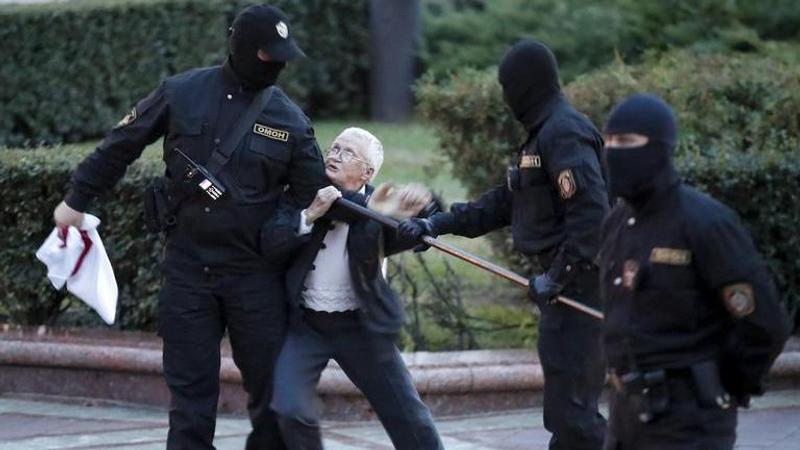Published 07:24 IST, January 23rd 2021
Opposition leader urges UN to halt Belarus media crackdown
The main opposition challenger in Belarus’ disputed presidential election urged the United Nations on Friday to call for a halt to “violence and lawlessness” in the country, including media censorship, internet shutdowns, website blockages and cancellation of accreditation for journalists

The main opposition challenger in Belarus’ disputed presidential election urged the United Nations on Friday to call for a halt to “violence and lawlessness” in the country, including media censorship, internet shutdowns, website blockages and cancellation of accreditation for journalists.
Former presidential candidate Sviatlana Tsikhanouskaya told an informal meeting of the U.N. Security Council that since September the situation in her nation “has only worsened” and the media remain under assault from President Alexander Lukashenko’s regime.
Mass protests have gripped Belarus, a former Soviet nation of 9.5 million people, since official results from the Aug. 9 presidential election gave Lukashenko a landslide victory over Tsikhanouskaya. She and her supporters refused to recognize the result, saying the vote was riddled with fraud.
Authorities have cracked down on the largely peaceful demonstrations, the biggest of which attracted up to 200,000 people. Police have used stun grenades, tear gas and truncheons to disperse the rallies, and thousands of people have been beaten. Nevertheless, the protests have continued.
According to the Belarusian Association of Journalists, in 2020 independent journalists were detained over 470 times, 97 served administrative arrests, 50 media websites were blocked, and 15 journalists are currently facing “false criminal charges,” Tsikhanouskaya said.
But the former English language teacher said the assault on the media “is just part of the bigger picture of repression in Belarus," where she said more than 32,000 people have been detained and about 900 are suspects in politically motivated criminal cases. She said the U.N. has reported 400 cases of torture and eight activists have died “in relation to state-backed violence.”
“Not a single government official has been held responsible,” she said.
“In spite of this violence, Belarusians continue protesting every day," Tsikhanouskaya said. “This demonstrates courage, dignity and resilience.”
Among journalists under arrest are four members of the Belarus Press Club, including its founder, Yuliya Slutskaya; Ihar Losik, administrator of the most popular social media channel in the country who has been on hunger strike for over a month; and three female journalists imprisoned on charges of organizing mass protests and disclosing information about a protester, Roman Bandarenka, who was “killed by the regime’s cronies,” Tsikhanouskaya said.
She said her husband, prominent video blogger Siarhei Tsikhanouski, “is charged with organizing mass protests but his guilt is telling the truth and running for president.” She said she and their two children haven’t seen him for almost eight months.
Tsikhanouskaya became a presidential candidate after her husband’s arrest on May 29, and she fled to neighboring Lithuania after the election in fear of repercussions.
Pavel Latushka, a member of the Belarus opposition’s Coordination Council, highlighted examples of “the essential role of independent media that show the abuses perpetrated by the Lukashenko regime.” Several journalists spoke of their ordeals and their colleagues’ courageous reporting.
Tsikhanouskaya said the U.N. should “take a vocal stand to stop the violence and lawlessness in Belarus,” including against the media, and she called on the Security Council to put Belarus on its agenda -- a move strongly opposed by council member Russia, which is Belarus' neighbor and ally.
The virtual council meeting was organized by Estonia and co-sponsored by France, Ireland, Norway, the United Kingdom and the United States.
Estonian Foreign Minister Urmas Reinsalu expressed alarm that “representatives of free media -- journalists, cameramen, bloggers -- have been turned into a target for the government’s repression along with the protesters.”
Russia’s deputy U.N. ambassador, Dmitry Polyansky, called the meeting “a clear provocation and a blatant attempt of interference into internal affairs of a sovereign state.”
He said claims where a losing side doesn’t accept election results and claims they were “fraudulent” and “rigged” aren’t rare. He pointed Donald Trump’s refusal to concede that he lost the U.S. presidential election to Joe Biden while claiming widespread election fraud.
Polyansky said there are further similarities between the United States and Belarus.
“The losing side instigates popular protest,” he said. “But there is a big difference in how these cases are presented by the Western media.”
“Whereas actions here (in the United States) are characterized as criminal, the actions of Belarusian opposition are being praised and its appeals are supported with sanctions while self-proclaimed leaders are being presented as legitimate leaders of the country `a la (Juan) Guaidó’” in Venezuela, Polyansky said.
Image credits: AP
Updated 07:24 IST, January 23rd 2021




